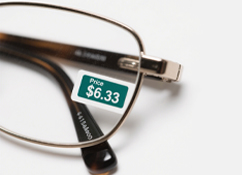Do Glasses Make Your Eyes Look Smaller? The Truth About Optical Illusions
Ever caught yourself thinking, “My eyes looked so much bigger before I needed nearsighted glasses”? You’re not alone. Tons of people feel like their eyes shrink once they start wearing glasses—some even skip wearing them entirely, putting up with blurry vision just to avoid that “small eye” look. But is it really the glasses’ fault? And do your eyes actually get smaller? Let’s break it down.
Why Nearsighted Glasses Make Eyes Seem Smaller (It’s an Illusion!)
First, let’s get one thing straight: Glasses don’t change your eye size. The “smaller” look is just a trick of light—specifically, how nearsighted lenses bend light.
Nearsightedness (myopia) happens when light from faraway objects lands in front of your retina (instead of on it), making distant things blurry. To fix this, nearsighted glasses use concave lenses—lenses that are thinner in the center and thicker at the edges.
Here’s the catch: Concave lenses bend light outward as it passes through. This creates an optical illusion where your eyes look slightly compressed or “shrunken” when someone looks at you through the lenses. The stronger your prescription (e.g., -5.00 diopters vs. -1.00), the more noticeable this effect is—thicker lens edges amplify the illusion.
Squinting Makes Eyes Look Smaller Too (And It’s Avoidable)
There’s another reason your eyes might seem smaller with glasses: squinting. When your vision is blurry (even a little), your brain automatically tells you to squint—narrowing your eyelids to focus light better. Over time, this habit can make your eyes look smaller, even when you’re not squinting.
The good news? This is easy to fix. Wearing your glasses (or contacts) consistently means you won’t need to squint to see clearly. Your eyelids stay relaxed, and your eyes look more like their natural size.
What About Farsighted or Astigmatism Glasses?
If you’re farsighted (hyperopia) or have astigmatism, you’re in luck—your glasses probably won’t make your eyes look smaller.
Farsighted glasses use convex lenses (thicker in the center, thinner at the edges). These lenses can make eyes look slightly larger (another optical illusion), but the effect is usually subtle—way less noticeable than the “shrinking” from nearsighted lenses.
Astigmatism glasses have irregularly shaped lenses to fix blurriness from a misshapen cornea. They rarely change how big your eyes look, since their shape is designed to correct light scatter, not compress or expand images.
Solutions If You Hate the “Small Eye” Look
If the nearsighted lens illusion bugs you, there are easy fixes to make your eyes look more natural:
Choose high-refractive-index lenses: These lenses are thinner and lighter than standard lenses (e.g., 1.67 or 1.74 index vs. 1.50). Thinner edges mean the “shrinking” illusion is way less noticeable.
Opt for smaller or oval frames: Big, oversized frames require larger lenses, which can make the concave effect stronger. Smaller, oval frames keep lens edges thin and minimize the illusion.
Try contact lenses: Contacts sit directly on your eye, so there’s no lens between your eyes and the world—no optical illusion, just your natural eye size.
Consider laser eye surgery: Procedures like LASIK or PRK correct nearsightedness permanently, so you won’t need glasses at all. Talk to an eye doctor to see if you’re a candidate.
FAQ: Do Glasses Really Affect Eye Size?
Q: Will wearing glasses every day make my eyes smaller over time?
A: No! Your eye size is determined by genetics and growth (it stops changing around age 18). Glasses only create a temporary optical illusion—they don’t alter your eye’s actual shape or size.
Q: Why do my eyes look “big” when I take my glasses off?
A: It’s just your brain adjusting! If you’re used to seeing your eyes through concave lenses (which make them look small), your natural eye size will feel “big” at first. It’s not a real change—just a perception shift.
Q: Can anti-glare coatings fix the “small eye” look?
A: Anti-glare coatings reduce reflections on your lenses, which makes your eyes easier to see (no more “shiny” lens surfaces hiding your gaze). They won’t eliminate the concave lens illusion, but they’ll make your eyes look more vibrant and less “hidden.”
The Bottom Line
Glasses don’t make your eyes smaller—they just create an optical illusion, especially with strong nearsighted prescriptions. If the look bugs you, thinner lenses, smaller frames, contacts, or laser surgery can help. But remember: Your natural eye size is perfect, and glasses are just a tool to help you see clearly. There’s no need to put up with blurry vision to “keep your eyes big”—clear sight and confidence go hand in hand.











